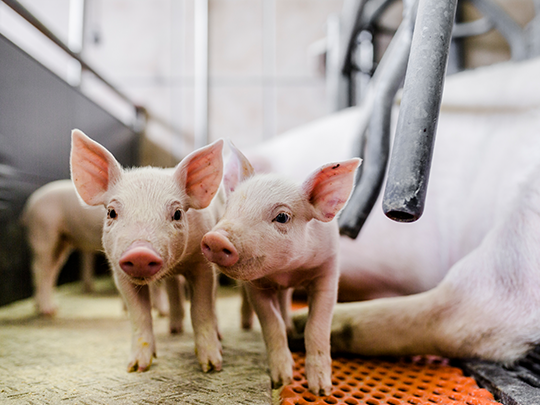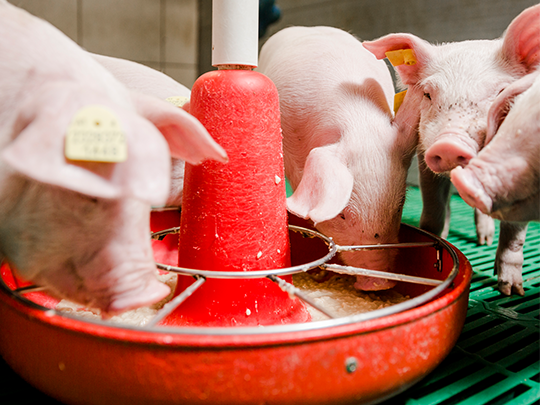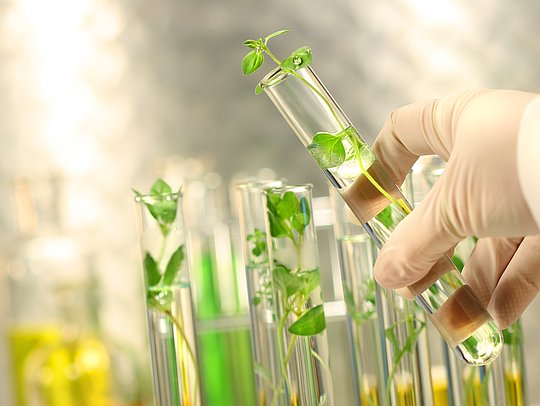The immune system in the spotlight: Phytogenic support for piglets - Part 3
It´s time for “the final” of our Immunity article – we´ll have a look at weaning, representing a critical phase for piglets in pig production. Which role does the immune system play in this context and how can phytogenics provide support?
Weaning: critical phase in piglets

Under natural conditions, piglets begin to ingest small amounts of water and feed in addition to their mother's milk from the 3rd week of life. They are finally weaned off completely by the sow at the age of 13 to 17 weeks. This drastically differs in modern pig production and weaning the piglets is one of the major challenges. In conventional pig farming, piglets are usually weaned early, at the age of 3 to 4 weeks. This causes considerable stress to the youngsters: the early separation from the mother sow, the sudden change of feed from the mother's milk to cereal based diets, an unfamiliar, new environment with new pen mates and exposure to previously “unknown” pathogens.
And we all know that stress has a negative effect on the immune system. During this period, the immune system of a piglet is in its weakest state.
As already mentioned, of the vast majority of antibodies directly after birth is received via the colostrum. However, the supply of protective immunoglobulins decreases over time due to changes in the composition of the sow´s milk. At the same time, the development of the body's own adaptive immunity is not yet complete. A further complication arises due to a piglets’ reduced feed intake in this transition time. Without sufficient nutrient intake the intestinal tract is not properly developing, reflected by histomorphological observations such as a shortening of the intestinal villi and reduction of secreted intestinal enzymes. In turn this prevents a full digestion of the feed, with nutrients remaining in the intestine available for microbial fermentation. This may cause diarrhea and pave the way for proliferation of pathogens. Therefore, many piglets are more susceptible against infections during the time of weaning. Unfortunately, some pathogens (e.g., porcine circovirus, PRRS) affect and even damage certain cells of the immune system. Supporting the piglets’ immune system especially during this critical period of life is therefore an auspicious strategy to improve animal welfare and reduce economic losses.
Phytogenic support for the immune system

As, for economic reasons, there is no way to avoid early weaning of the piglets, the young animals must be supported best possible to overcome this critical phase. Whether the issue is management strategies or nutritional strategies, including dietary supplements, the targets are clear: enhancing the piglets’ ability to have proper feed intake and preventing pathogens from colonizing the intestine. This will support the animals in a normal development of the gastro-intestinal tract and reduce occurrence of disease and growth performance depression.

Especially at times, when the call for antibiotic-free animal production is becoming louder and louder, farmers and scientists are looking for potential alternatives to enhance performance of animals in a natural way. Many secondary plant constituents and bio actives, deriving from plants and their extracts, are known for their beneficial effects on animals, including anti-inflammatory and immunomodulatory actions. A characteristic that we also benefit from in our well-formulated phytogenic feed additives.

Elisabeth Rohrer
After her study in agriculture sciences at the university of natural resources and life sciences in Vienna, Elisabeth joined the Delacon team in December 2013 as Technical Communications Manager - a position, she always exerted with pleasure. Since 2021, her task areas have been extended and thus, she is also supporting colleagues in writing offside the technical focus as Content Manager. Elisabeth describes herself as a great animal and nature lover and prefers to spend her free time high up in the mountains with her little family, away from the hustle and bustle.










